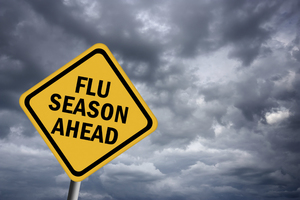

People with diabetes are at "high risk" for complications from the flu. Both the flu and COVID-19 have higher risk of complications in those with diabetes. Last year, our flu season was relatively low, most likely due to the masking and social distancing practices that were in place to protect us from COVID, and that also worked to protect us from the flu but as our communities return to pre-pandemic routines, research has shown that people with diabetes are more likely to be hospitalized or to require intensive care if they develop the flu compared to people who do not have diabetes. The flu vaccine has been shown to reduce hospitalization rates by up to 70%. Therefore Diabetes Canada Clinical Practice Guidelines for the Prevention and Management of Diabetes in Canada recommend:
"All people with diabetes should receive an annual influenza immunization"

It is a common and highly contagious respiratory infection that affects the nose, throat, and lungs. Flu strains change from year to year, therefore it is important to get your flu shot every year. If you think you may have the flu, you should stay home and self-isolate.
It typically occurs between November and April.
Most children and adults can receive their flu shots from their doctor, participating pharmacies, or some public health units. Pharmacies do not typically vaccinate children < 2 yrs.
Like the flu virus, those with diabetes can be susceptible to more severe infections and complications if they contract the COVID-19 virus. Health authorities continue to recommend both COVID and flu vaccines and to practise all the behaviours suggested by Public Health: hand washing, social distancing and wearing a mask when you cannot safely distance, which go a long way to protecting yourself and others from both the flu and COVID-19.
Click here to read an article from the World Health Organization that helps explain some of the differences between COVID-19 and the common flu. Many of the symptoms of COVID-19 and the flu are similar and it may be hard to tell the difference. You may require a COVID test to determine a diagnosis.
Public Health Ontario advises anyone with flu symptoms to get COVID tested and self isolate at home for 14 days or until your test results come back negative for COVID-19.
When do I call my doctor?
For more information on the seasonal flu and how to protect yourself, click here Some information adapted from an article by Everyday Health |
 |